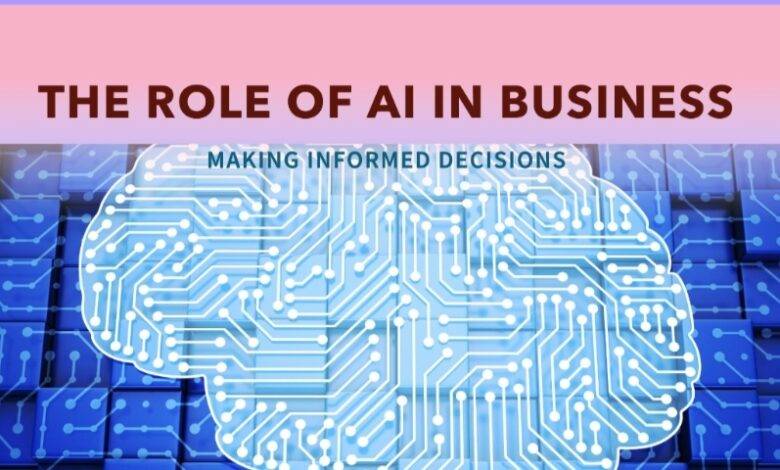The Role of AI in Business Decision Making

Artificial Intelligence (AI) has become an integral part of modern business strategies, transforming how companies make decisions and operate. AI technologies, such as machine learning, natural language processing, and predictive analytics, are increasingly being used to analyze vast amounts of data, identify patterns, and provide actionable insights. This integration of AI into business decision-making processes is not only enhancing efficiency but also enabling companies to make more informed and strategic choices. This article delves into the role of AI in business decision-making, exploring its benefits, applications, and future potential.
The introduction of AI into the business world is driven by the need to handle the ever-growing volume of data and the demand for faster, more accurate decision-making. Traditional decision-making methods often rely on human intuition and experience, which can be biased and limited by cognitive constraints. AI, on the other hand, offers a data-driven approach, leveraging advanced algorithms to process and analyze information objectively. By integrating artificial intelligence marketing solutions into decision-making processes, businesses can achieve greater accuracy, reduce risks, and uncover new opportunities.
Enhancing Data Analysis:
One of the primary roles of AI in business decision-making is enhancing data analysis. AI-powered tools can process vast amounts of data at unprecedented speeds, identifying trends, correlations, and anomalies that might be overlooked by human analysts. Machine learning algorithms, for instance, can learn from historical data and continuously improve their accuracy in predicting future outcomes.
This enhanced data analysis capability allows businesses to make more informed decisions based on empirical evidence rather than intuition. For example, in the financial sector, AI can analyze market data to predict stock price movements, helping investors make better investment decisions. In marketing, AI can analyze consumer behavior data to identify target audiences and optimize marketing campaigns. By leveraging AI for data analysis, businesses can gain deeper insights into their operations and market dynamics, leading to more effective and strategic decision-making.
- Daniel Foley, head of content at Believe Money
Improving Strategic Planning:
Strategic planning is another area where AI is making a significant impact. Strategic decisions often involve long-term planning and consideration of various external and internal factors. AI can assist in this process by providing predictive analytics and scenario analysis, helping businesses anticipate future trends and prepare for different possible outcomes.
For instance, AI can analyze market data, economic indicators, and competitor activities to predict future market conditions and identify potential opportunities and threats. This information can be used to develop more robust and adaptable business strategies. Additionally, AI can simulate different scenarios and assess their potential impact on the business, enabling decision-makers to evaluate various options and make more informed strategic choices. By incorporating AI into strategic planning, businesses can enhance their agility and competitiveness in an ever-changing market landscape.
- Harry Max from Help Treatment
Enhancing Customer Experience:
AI plays a crucial role in enhancing customer experience, which is a key factor in business success. AI technologies, such as natural language processing and sentiment analysis, can analyze customer interactions and feedback to understand their preferences, needs, and sentiments. This information can be used to personalize customer experiences and improve customer satisfaction.
For example, AI-powered recommendation systems can analyze customer purchase history and browsing behavior to suggest products or services that match their interests. In customer service, AI tools like, talkie-ai.com/ can analyze past interactions to provide personalized support and resolve issues more effectively. By leveraging AI to enhance customer experience, businesses can build stronger customer relationships, increase loyalty, and drive growth.
- Tiffany Payne, Head of Content at PharmacyOnline
Mitigating Risks:
Risk management is an essential aspect of business decision-making, and AI is proving to be a valuable tool in this area. AI can analyze historical data, identify patterns, and predict potential risks, enabling businesses to take proactive measures to mitigate them. This capability is particularly important in industries such as finance, healthcare, and manufacturing, where risks can have significant consequences.
For instance, in the financial industry, AI can detect fraudulent transactions by analyzing transaction patterns and identifying anomalies. In healthcare, AI can predict patient outcomes and identify potential complications, allowing for early intervention. In manufacturing, AI can predict equipment failures and schedule maintenance to prevent costly downtime. By using AI to mitigate risks, businesses can enhance their resilience and protect their assets and reputation.
- Andy Fryer, Co-Founder of Easy Signs
Facilitating Real-Time Decision Making:
The ability to make real-time decisions is crucial in today’s fast-paced business environment. AI enables businesses to process and analyze data in real time, providing actionable insights that can be used to make immediate decisions. This capability is particularly valuable in areas such as supply chain management, financial trading, and customer service, where timely decisions can significantly impact outcomes.
For example, in supply chain management, AI can analyze real-time data on inventory levels, demand forecasts, and supplier performance to optimize procurement and production schedules. In financial trading, AI algorithms can analyze market data and execute trades within milliseconds, taking advantage of fleeting opportunities. In customer service, AI can analyze real-time customer interactions to provide immediate support and resolution. By facilitating real-time decision-making, AI enables businesses to respond quickly to changing conditions and capitalize on opportunities.
- Marley Hayles, Digital Marketing Manager at HomeTree
Enhancing Decision-Making in Human Resources:
Human resources (HR) is another area where AI is transforming decision-making processes. AI can assist HR professionals in various tasks, such as talent acquisition, performance management, and employee engagement, by providing data-driven insights and automating routine decisions.
For example, AI can analyze resumes and job applications to identify the best candidates for a position, reducing the time and effort required for recruitment. In performance management, AI can analyze employee performance data to identify high performers and areas for improvement, enabling more targeted development and recognition programs. AI can also analyze employee engagement data, such as survey responses and feedback, to identify factors affecting morale and retention, allowing HR to take proactive measures to enhance the workplace environment. By leveraging AI in HR decision-making, businesses can improve their workforce management and create a more productive and engaged workforce.
- Hilary Kinsella, Director of Operations at Money Spider
Conclusion:
The role of AI in business decision-making is multifaceted and transformative. By enhancing data analysis, automating routine decisions, improving strategic planning, enhancing customer experience, mitigating risks, facilitating real-time decision-making, and transforming HR processes, AI enables businesses to make more informed, efficient, and strategic choices. As AI technologies continue to advance, their impact on business decision-making will only grow, offering new opportunities for innovation and growth. Embracing AI in decision-making processes is not just an option but a necessity for businesses aiming to thrive in the digital age.



